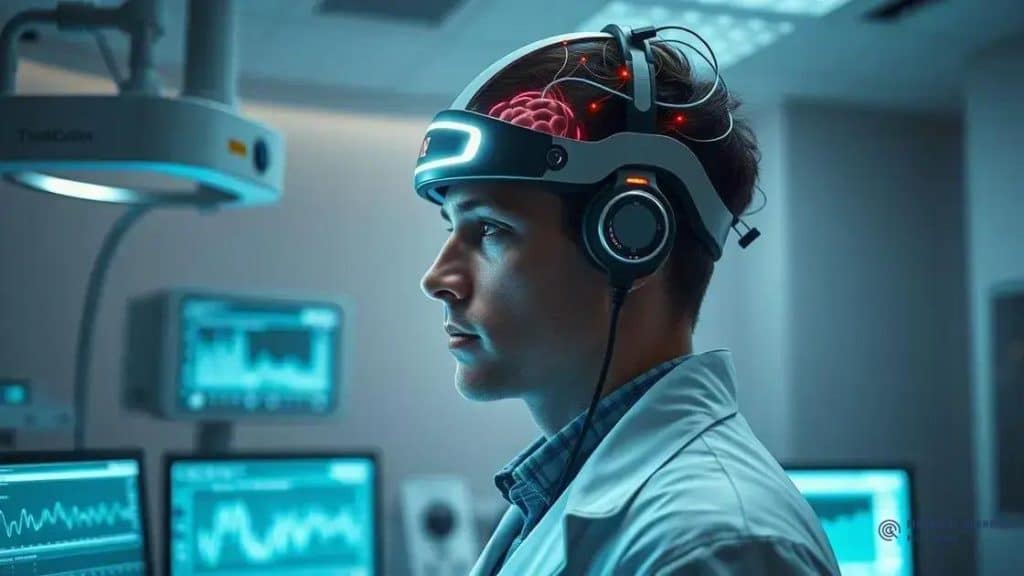Advances in technologies for neurological enhancement

Advances in technologies for neurological enhancement aim to improve cognitive abilities and mental health through innovative tools like brain-computer interfaces and neurostimulation techniques, requiring careful ethical considerations as they evolve.
Advances in technologies for neurological enhancement are making waves in science and medicine. Have you ever wondered how these innovations can enhance cognitive abilities and improve mental well-being? Let’s dive into the fascinating world of neurological technologies.
Understanding neurological enhancement technologies
Understanding neurological enhancement technologies is essential to grasp how these advancements are transforming lives. These technologies, which include a variety of tools and techniques, aim to improve cognitive functions and enhance mental health.
One of the key areas of focus is the development of brain-computer interfaces (BCIs). These amazing devices enable communication between the brain and external devices, allowing individuals to control technology using their thoughts. They are particularly valuable for people with disabilities, offering new avenues for interaction and independence.
Types of Neurological Enhancement Technologies
There are several types of neurological enhancement technologies that are making significant impacts in the field:
- Neurostimulation: Techniques such as transcranial magnetic stimulation (TMS) can improve mood and cognitive function.
- Brain-Computer Interfaces: These allow users to operate computers or devices directly with their brain activity.
- Neurofeedback: This method teaches individuals to control brain function through feedback on their brain activity.
- Cognitive enhancers: Pharmaceuticals designed to improve focus, memory, and overall cognitive function.
As we explore the realm of neurological enhancement, it’s clear that these technologies are still evolving. The ongoing research and development are crucial for uncovering their full potential. Moreover, ethical discussions surrounding their use are vital, ensuring that advancements benefit society fairly and responsibly. In addition to practical applications, these innovations spark curiosity about the future of human cognition and capabilities.
Increasingly, these advancements encourage collaboration between scientists, engineers, and healthcare professionals. The development of neurological enhancement technologies reflects a profound intersection of fields that can lead to breakthroughs previously thought impossible. Over time, we can anticipate even more sophisticated solutions that could fundamentally alter our understanding of the human mind and improve the quality of life for many.
Key innovations in brain-computer interfaces

Key innovations in brain-computer interfaces (BCIs) are paving the way for remarkable advancements in how we interact with technology. These interfaces bridge the gap between the human brain and machines, allowing thoughts to control devices directly. This revolutionary technology is transforming various fields including healthcare, gaming, and assistive devices.
Recent Breakthroughs in BCI Technology
Recent breakthroughs are enhancing how BCIs function and their applications:
- Wireless Communication: Modern BCIs are increasingly wireless, enabling users to interact with devices without cumbersome attachments.
- Increased Accuracy: With improved algorithms, BCIs can more accurately interpret brain signals, leading to smoother control of devices.
- Miniaturization: The development of smaller sensors has made BCIs more user-friendly and easier to integrate into daily life.
- Neural rehabilitation: Innovative techniques are helping individuals recover motor functions after injuries by providing targeted stimulation.
These advancements are catching the attention of researchers and developers worldwide. As BCIs grow in sophistication, they open up new possibilities for applications beyond simple device control. For instance, they may allow for enhanced communication for those with severe disabilities. This could give them a voice and agency that many take for granted.
Exploring the potential of brain-computer interfaces raises insightful questions about the future of human capabilities. With the right technology, individuals could augment their cognitive abilities, interact seamlessly with smart environments, and enhance human experiences in unimaginable ways. Continued research and innovation will be crucial to ensure ethical development and implementation of these exciting technologies.
The role of neurostimulation in therapy
The role of neurostimulation in therapy is significant in treating various neurological and psychological conditions. This innovative approach uses electrical impulses to stimulate specific areas of the brain, helping to alleviate symptoms and improve quality of life for many individuals.
Types of Neurostimulation Techniques
There are several effective neurostimulation techniques that are widely used in therapeutic settings:
- Transcranial Magnetic Stimulation (TMS): A non-invasive procedure that uses magnetic fields to stimulate nerve cells in the brain, often used for depression.
- Deep Brain Stimulation (DBS): This surgical technique involves implanting electrodes in the brain to help control movement disorders, such as Parkinson’s disease.
- Vagus Nerve Stimulation (VNS): A device implanted under the skin that sends electrical impulses to the brain via the vagus nerve, used for epilepsy and depression.
- Peripheral Nerve Stimulation (PNS): Focuses on stimulating peripheral nerves to manage pain and other symptoms.
These treatments offer hope where traditional therapies may fall short. For instance, TMS has shown considerable success in treating patients who do not respond to medication for depression. By targeting specific areas of the brain, these therapies can reset neural pathways, leading to improvements in mood and functioning.
Furthermore, the applications of neurostimulation are continuously expanding. Research is ongoing to better understand its effects on other conditions such as anxiety, chronic pain, and even addiction. As scientists learn more, these treatments could revolutionize how we approach mental health and neurological disorders.
Each type of neurostimulation has its own unique mechanisms and benefits, allowing for tailored approaches to individual patient needs. This personalization is essential in maximizing therapeutic outcomes and minimizing side effects.
Ethical considerations in neurological enhancements

Ethical considerations in neurological enhancements are crucial as technology advances. As we enhance cognitive functions and modify brain activity, we must address the implications of these changes on individuals and society.
Potential Benefits and Risks
Understanding the benefits and risks of neurological enhancements is essential:
- Increased Cognitive Abilities: Enhancements could lead to improved focus, learning speed, and memory capabilities.
- Access and Equality: Ensuring that everyone has equal access to these technologies is vital to prevent widening the gap between different socioeconomic groups.
- Informed Consent: Patients should fully understand the risks and benefits before undergoing any enhancements.
- Long-Term Effects: Research is needed to understand the long-term consequences of these technologies on mental health and identity.
As advancements occur, questions about the morality of altering the human brain arise. For instance, how far is too far when it comes to enhancing cognitive abilities? Are we playing with the essence of what makes us human? These considerations are increasingly relevant as the line between natural and enhanced cognition blurs.
Furthermore, we must also consider the implications of enhancement technologies in competitive environments, such as education and the workplace. Could these enhancements create unfair advantages or expectations? Defining clear guidelines and ethical boundaries is vital to address these concerns.
The dialogue surrounding ethical considerations in neurological enhancements is ongoing, reflecting a need for balance between innovation and moral responsibility. Engaging various stakeholders, including scientists, ethicists, and the public, is essential for developing thoughtful policies that govern the use of these technologies.
Future possibilities for brain technology
The future possibilities for brain technology are exciting and full of potential. As research progresses, we anticipate remarkable innovations that may transform how we understand and enhance the human mind.
Emerging Technologies
New technologies are on the horizon that could revolutionize brain science:
- Advanced Neural Interfaces: Future brain-computer interfaces (BCIs) may allow for seamless interaction between the brain and various devices, enhancing communication and control.
- AI Integration: Incorporating artificial intelligence could lead to personalized brain treatments and cognitive enhancements tailored to individual needs.
- Neuroimaging Advances: Improved imaging technologies may allow for real-time monitoring of brain activity, offering insights into neurological disorders and mental health.
- Brain-to-Brain Communication: Research may eventually lead to direct communication between brains, enabling new forms of interaction and collaboration.
As these technologies develop, their applications are likely to expand beyond medical uses into education, entertainment, and everyday life. Imagine a world where learning is accelerated through direct neural sharing of knowledge or where complex tasks can be performed effortlessly with enhanced cognitive abilities.
Ethical considerations will also need to evolve alongside these advancements. As technologies become more powerful, society must address the implications of enhancing cognitive functions and altering what it means to be human. Questions about privacy, access, and consent will become even more pertinent in the years to come.
The dialogue around the future of brain technology is essential. Engaging diverse voices from scientists, ethicists, and the public will be crucial in shaping responsible policies. With careful thought and innovation, we can harness these technologies to improve lives while safeguarding personal and societal values.
FAQ – Frequently Asked Questions about Neurological Enhancements
What are neurological enhancements?
Neurological enhancements refer to technologies, therapies, and techniques that aim to improve cognitive functions and mental health by modifying brain activity.
How can neurostimulation help in therapy?
Neurostimulation can alleviate symptoms of conditions like depression and Parkinson’s disease by using electrical impulses to stimulate specific brain areas.
What are some ethical concerns regarding brain technology?
Key ethical concerns include informed consent, equitable access to technology, and the potential impacts on personal identity and societal norms.
What future applications can we expect from brain technology?
Future applications may include advanced brain-computer interfaces, AI integration, and enhanced communication methods, opening new possibilities for learning and interaction.





